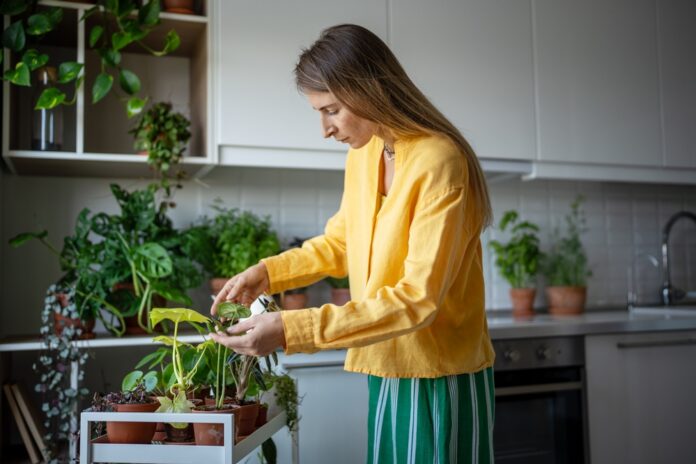In an increasingly hectic world, finding ways to unwind and reconnect with nature has become essential for maintaining mental well-being. Gardening offers a serene escape, allowing individuals to immerse themselves in the rhythm of the natural world while cultivating beauty and life.
A Natural Antidote to Stress
Gardening provides more than just aesthetic pleasure; it serves as a therapeutic practice that can significantly reduce stress levels. Engaging with soil and plants offers a sensory experience that calms the mind and redirects focus from daily worries.
Research has shown that exposure to green spaces and nature can reduce stress markers and improve mood, leading to enhanced psychological well-being. The act of nurturing plants encourages mindfulness, grounding individuals in the present moment and fostering a sense of peace.
Physical Health Benefits
Beyond mental relaxation, gardening is a form of moderate exercise that contributes to physical health. Activities like digging, planting, and weeding involve bending, stretching, and light lifting, which can improve strength, flexibility, and endurance.
The Centers for Disease Control and Prevention note that engaging in 2.5 hours of moderate physical activity, such as gardening, each week can lower the risk of chronic illnesses like heart disease and diabetes.
Boosting Immunity and Vitamin D Intake
Spending time outdoors while gardening increases exposure to sunlight, enhancing vitamin D production. This boost not only strengthens bones but also improves immune function and mood.
Sunlight stimulates the production of serotonin, a hormone associated with happiness and well-being. By increasing vitamin D levels and mood-enhancing hormones, gardening naturally combats feelings of depression and anxiety.
Cultivating Mindfulness and Cognitive Function
Gardening promotes mindfulness by requiring attention to the immediate tasks at hand. This focus can improve memory retention and prevent cognitive decline, helping to keep the mind sharp.
The repetitive nature of gardening tasks allows for contemplation and mental clarity. It’s a form of active meditation that can be especially beneficial for those struggling with stress or mental health challenges.
Social Connections and Community Building
Gardening can also be a social activity that strengthens community bonds. Community gardens and group horticultural projects provide opportunities for social interaction and teamwork, reducing feelings of isolation.
During the COVID-19 pandemic, many people turned to gardening as a safe way to connect with others and alleviate loneliness. A survey conducted by the University of California, Davis found that gardening offered relaxation and stress relief, with participants experiencing increased joy and a sense of control over food production. This study highlighted how gardening became a coping mechanism, providing relaxation, stress relief, and a communal activity.
Nutritional Benefits of Homegrown Produce
Growing your own fruits, vegetables, and herbs not only enhances your diet with fresh, nutrient-rich foods but also fosters a deeper appreciation for what you consume. Gardeners often find themselves eating a wider variety of produce, promoting healthier eating habits.
Starting with easy-to-grow plants like herbs, lettuce, or kale can make gardening accessible for beginners. These nutrient-dense options simplify gardening and promote adventurous eating, benefiting both physical health and culinary exploration.
Environmental Impact and Sustainability
Gardening contributes positively to the environment by promoting biodiversity, reducing carbon footprints, and combating climate change. Practices like composting reduce waste, while planting diverse flora supports local ecosystems.
By conserving water, promoting biodiversity, and reducing waste through composting, gardening serves as a personal step towards environmental sustainability. These efforts not only enhance individual lifestyles but also contribute to the health of the planet.
Overcoming Challenges and Embracing Growth
While gardening offers numerous benefits, it can come with challenges, especially for beginners. Issues like nutrient-deficient soil or plant health problems may arise, but overcoming these obstacles can provide a sense of accomplishment and resilience.
Transforming a garden space into a personal sanctuary filled with flowers, succulents, or even water features can enhance your home environment and provide a serene retreat. These personalized spaces not only bring aesthetic pleasure but also attract beneficial wildlife like butterflies, adding to the garden’s tranquility.
Getting Started: Tips for New Gardeners
Embarking on your gardening journey doesn’t have to be daunting. Here are some tips to help you begin:
- Start Small: Begin with a few plants that are easy to manage, such as herbs or potted vegetables.
- Know Your Space: Assess the sunlight, soil type, and climate of your gardening area to choose suitable plants.
- Use the Right Tools: Invest in basic gardening tools like gloves, a trowel, and pruning shears to make tasks easier.
- Educate Yourself: Utilize resources like local gardening clubs or online forums to gain knowledge and support.
- Be Patient: Gardening is a learning process. Embrace the journey and learn from each season.
Conclusion
Gardening is more than just a hobby; it’s a holistic practice that nurtures the mind, body, and environment. By immersing ourselves in the natural world, we can relieve stress, improve our physical health, and contribute to the well-being of our communities and planet.
Whether you have a sprawling backyard or a small balcony, consider picking up a spade and experiencing the myriad benefits that gardening has to offer. It’s time to dig in and grow not just plants, but also our own well-being.


